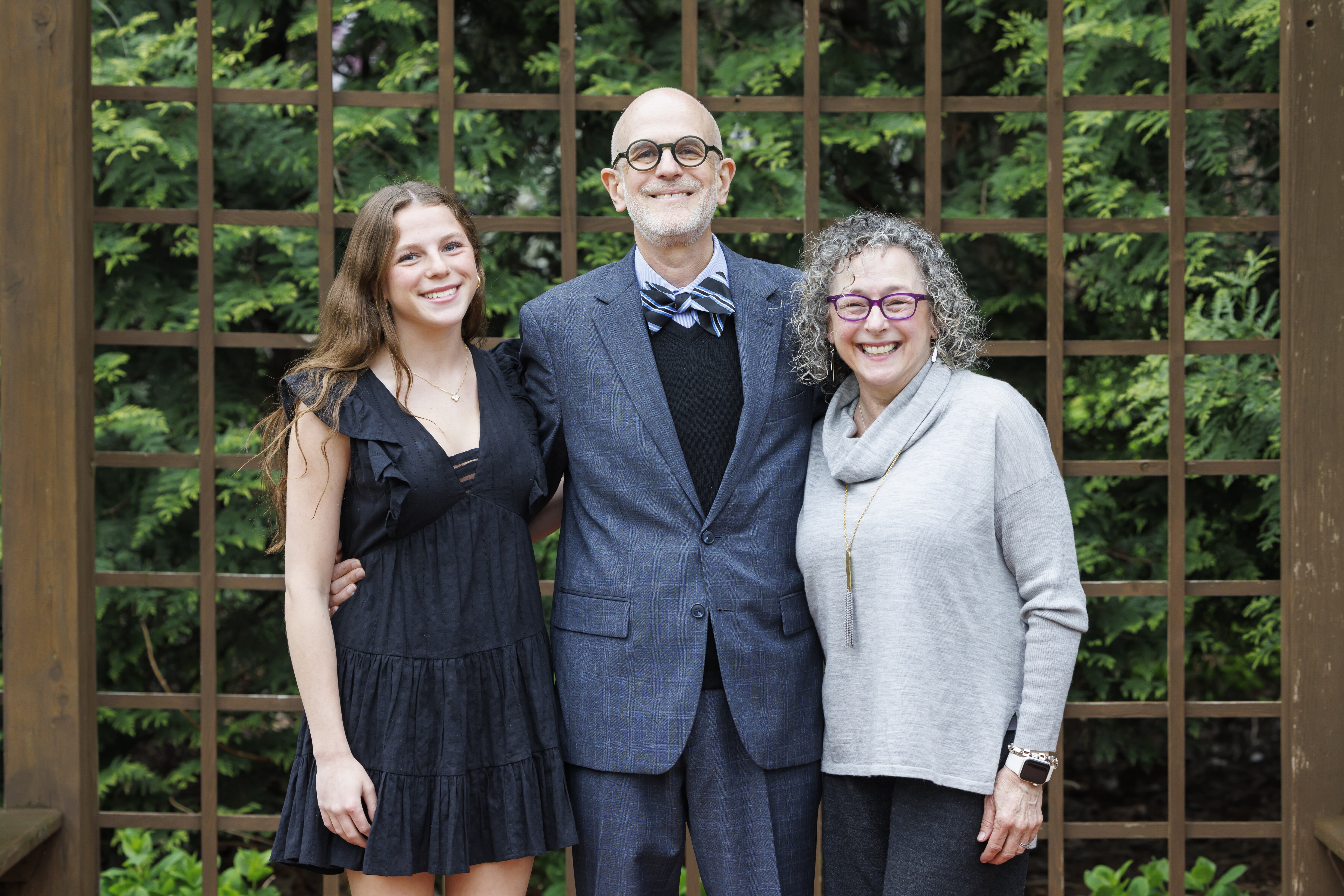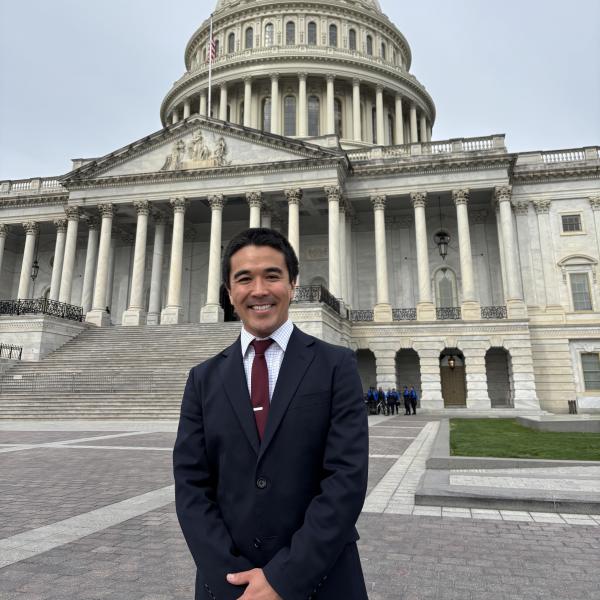During his installation ceremony on April 3, Jonathan Judaken, the Gloria M. Goldstein Professor of Jewish History & Thought, delivered an address titled “Antisemitism and Anti-Antisemitism.”

Jonathan Judaken was installed as the Gloria M. Goldstein Professor of Jewish History & Thought on April 3. The program included a welcome from Feng Sheng Hu, the Richard G. Engelsmann Dean of Arts & Sciences and Lucille P. Markey Distinguished Professor; remarks from Erin McGlothlin, vice dean of undergraduate affairs and the Gloria M. Goldstein Professor of Holocaust Studies; and the installation and medallion presentation by Provost Beverly Wendland.
In his remarks, entitled “Antisemitism and Anti-Antisemitism,” Judaken discussed how growing up Jewish in South Africa’s Apartheid shaped his professional work. Chair of the Department of Jewish, Islamic, and Middle Eastern Studies, Judaken has been credited with introducing the term “anti-antisemitism” into academic discourse. “Most of my work has been about how people understand antisemitism, either to oppose or to counter it,” he said. “It is about anti-antisemitism.”
Judaken emphasized that the fight against antisemitism should not be used as a political weapon. “Today, both antisemitism and anti-antisemitism are being instrumentalized and weaponized,” he said.
Judaken thanked his wife, Jaynie, his family, and his friend and editor, Torbjorn Wandel, for their support throughout his career. “I could not have done this work without them.”
About Jonathan Judaken
Jonathan Judaken is the Gloria M. Goldstein Professor of Jewish History and Thought and chair of the Department of Jewish, Islamic, and Middle Eastern Studies at WashU. He earned a bachelor’s degree in philosophy from the University of California San Diego, followed by a master’s degree and PhD in history from the University of California, Irvine.
Judaken is the author of many academic articles on the history of existentialism, anti-Semitism, racism, critical theory, and post-Holocaust French Jewish thought. He has written, edited, or co-edited seven books.
He published the monograph Jean-Paul Sartre and the Jewish Question: Anti-antisemitism and the Politics of the French Intellectual (2006); edited Race After Sartre: Antiracism, Africana Existentialism, Postcolonialism (2008) and Naming Race, Naming Racisms (2009); and co-edited Situating Existentialism: Key Texts in Context (2012), Memphis: 200 Years Together (2019), and The Albert Memmi Reader (2020), for which he wrote the introduction. His new monograph, Critical Theories of Anti-Semitism, was recently published under the Columbia University Press series “New Directions in Critical Theory.”
Alongside these books, he edited and wrote the lead article for a roundtable in the American Historical Review titled “Rethinking Anti-Semitism” (October 2018) and co-edited and introduced a special issue of Jewish History on “Jews and Muslims in France Before and After Charlie Hebdo and Hyper Cacher” (September 2018).
Judaken has visited Israel and South Africa as a Fulbright Senior Specialist and was previously a scholar-in-residence at the Center for Advanced Holocaust Studies at the United States Holocaust Memorial Museum (2006-2007). He was a National Endowment for the Humanities Fellow at Harvard (2000) and the College of Charleston (2019).
Judaken serves as U.S. contributing editor for the journal Patterns of Prejudice, on the associate editorial board for the journal Critical Philosophy of Race, on the editorial board for Jewish Historical Studies, and on the international board of scholars for Facing History and Ourselves. He was a founding member of the International Consortium for Research on Antisemitism and Racism. Judaken has published journalistic and op-ed pieces in Ha’aretz, Inside Higher Ed, Times Higher Education, the Huffington Post, Tablet, Tikkun, and the Forward. For seven years, he hosted a monthly radio show on NPR-WKNO for the Mid-South called “Counterpoint,” which focused on academic and intellectual contributions to discussions in the public sphere. He also created and long voiced a weekly segment on WKNO called “Spotlight on Lifelong Learning” that still runs.
About Gloria M. Goldstein
In honor of his wife Gloria Mintz Goldstein, Samuel R. Goldstein established a professorship in 1980 to “complement existing programs at Washington University in Jewish Studies” and “to utilize and strengthen the extensive Judaica collections in the John M. Olin Library.”
Mr. and Mrs. Goldstein had strong ties to the WashU. Mrs. Goldstein, who died in 1975, studied occupational therapy. Mr. Goldstein was awarded the University’s 2nd Century Award in 2000.
After graduating from Brooklyn College, Mr. Goldstein served in the Army Air Corps at Scott Air Force Base, where he met his future wife on a blind date. After the couple married in 1945, Mr. Goldstein joined his father-in-law’s company, later known as Apex Oil Corporation. Through Mr. Goldstein’s leadership, Apex was transformed from a small oil terminaling company into a multibillion-dollar international oil trading, refining, and marketing empire.
Mr. Goldstein was committed to using his wealth for the benefit of causes and charities that had meaning in his life. An unpretentious man who cherished his privacy, he carried out his philanthropy either anonymously or through gifts in his wife’s name. WashU was among the many beneficiaries of his generosity to the St. Louis community. In addition to this professorship, he established the David Rabinovitz Scholarship in the George Warren Brown School of Social Work, supported the Danforth Scholarships, made a large gift to the School of Medicine in honor of Dean William Peck, and provided leadership support to the Campaign for Washington University. Mr. Goldstein died in 2000.





